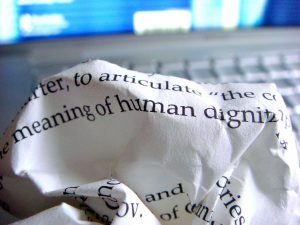 I run out of air when my colleague calls to inform me about a new policy for unaccompanied minors. How else are you supposed to react when you find yourself at the end of the road?
I run out of air when my colleague calls to inform me about a new policy for unaccompanied minors. How else are you supposed to react when you find yourself at the end of the road?
For you to realize what these words mean to our kids, the words would have to cry or scream out of agony. Because this decision to give the kids temporary residence permits, just to be able to deport them when they turn 18 takes away all their hope and prolongs the nightmare they already live in.
I cry easily, but actually what I feel is rage. Wrath, even. For how can you remove “aching reasons” from the legislation just because there are so many who have them?
And what are we going to say to our kids who struggle on with their Swedish lessons, go to school, do their unpaid internships, and who slowly built a trust that sometimes makes them dare to sleep at night?
On our wall there is a sign saying:
”just because it is black in the dark doesn’t mean there is no color”
One of our kids put it up because he thought it was a message that all the kids in the home needed to take part of. And now I cling to these words. Maybe we will find color even in this compact darkness.
These words come from Ulrika van den Berg who is a leader at Bracke Diakonie in Sweden. There she runs a home for unaccompanied minors who are incredibly vulnerable yet for whom changes in the law mean they may not be able to stay in Sweden. They are powerful words and tell of a Europe where political changes have personal consequences that go to the heart of humanity and dignity. This week those words were shared in the European Parliament as members spoke there about how social protection in Nordic countries is no longer meeting the needs of all and where inequalities are increasing along with extreme destitution.
Hosted by Cecilia Wikström MEP, members from Sweden and Denmark gave witness to the gaps and holes in Nordic social protection systems and how authorities have often abdicated their responsibility to ensure well-being, dignity and material needs. It is left to civil society organizations, often churches and diaconal organizations, to pick up the pieces of broken systems and broken lives; to bring color in the darkness. Our members will do that work, but as was done yesterday, they will also advocate for reforms and structural changes that ensure that justice and fairness are at the front of our political decisions. We were encouraged by the positive responses received from both the European Parliament and European Commission to our members’ advocacy and we hope that soon polices such as the ones that make Ulrika rage will be abolished and that everyone will live with color and not darkness.
Have a good weekend,
Heather